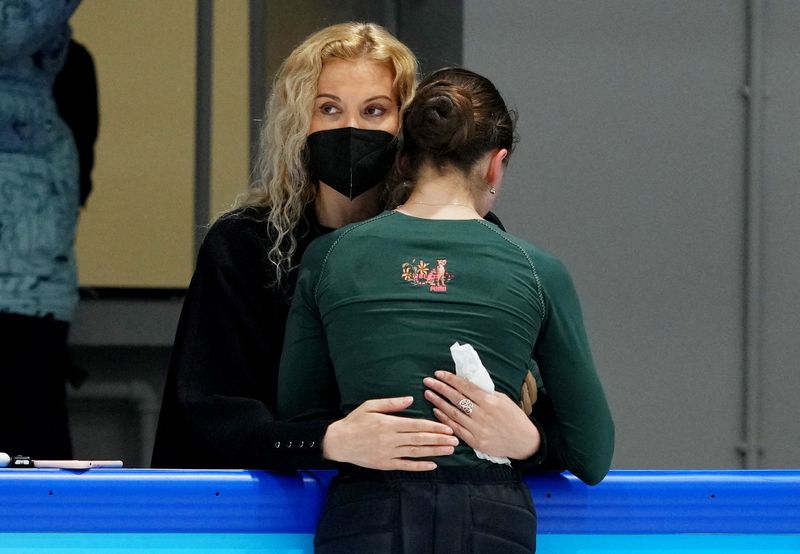By Gabrielle Tétrault-Farber, Polina Nikolskaya and Luc Cohen
BEIJING/MOSCOW/NEW YORK (Reuters) – The turmoil engulfing a 15-year-old Russian figure skater who tested positive for a banned substance has thrust her eminent coach and a doctor with past doping offences into the spotlight at the Beijing Games.
Teen skater Kamila Valieva was cleared on Monday to compete in her remaining event. But the drug charge against her is unresolved and anti-doping authorities in Russia are unlikely to hear her case until well after the Winter Games end.
As Valieva prepares to retake the ice on Tuesday, the role of her doctor and coach, along with other adults in the prodigy’s sporting career, has prompted outrage over how a minor could have taken the banned heart drug trimetazidine. Valieva’s case has shone a light on the conditions endured by the Russian teenagers who now dominate figure skating.
The World Anti-Doping Agency (WADA) said it would launch an independent investigation into the adults surrounding Valieva. WADA said the Russian Anti-Doping Agency was already investigating. [L8N2UO01M]
U.S. anti-doping officials said the Russians who have directed Valieva could also be prosecuted under the American Rodchenkov Act. The new laws empower U.S. prosecutors to seek fines of up to $1 million and jail terms of up to 10 years, even for non-Americans, if their actions have affected the results of U.S. athletes.
Valieva’s coach Eteri Tutberidze, who is known in skating circles for harsh training methods, faces heightened scrutiny at the Beijing Games. She is the most highly sought-after figure skating coach in Russia.
Filipp Shvetsky can be seen rinkside during Russian figure skaters’ competitions and practices. The towering, dark-haired physician works at a war veterans’ hospital in Moscow in addition to treating members of Russia’s figure skating team.
Shvetsky and several Russian rowers were suspended from the sport between 2007 and 2010 for anti-doping violations, said Jim Walden, an attorney for Grigory Rodchenkov, the former head of Russia’s anti-doping laboratory who turned whistleblower.
Rowing’s international governing body said at the time that the violations were related to prohibited intravenous infusions.
After his suspension was lifted, he joined the national figure skating team. The blame, Shvetsky said in a 2016 interview, was put on him in the hope of reducing the athletes’ suspensions.Walden said the doctor’s prior offences and the accusations made about the punishing environment Tutberidze creates for skaters made them prime targets for U.S. investigators.“They have someone who has a disciplinary history with […]
